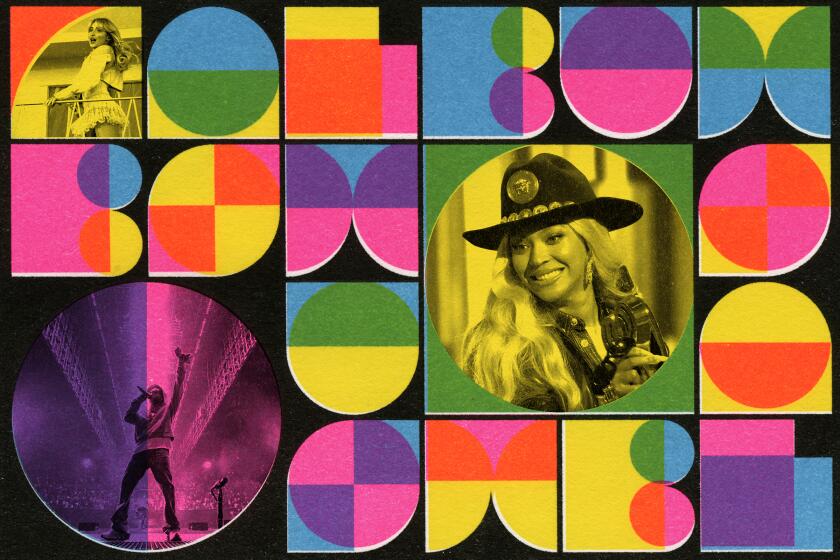Review: Nils Frahm turns solo piano into serrated techno, and back again
- Share via
Few musicians can take the simple act of walking across a stage and imbue it with as much meaning as Nils Frahm.
The German pianist and composer divided the stage in two at the Immanuel Presbyterian Church in Koreatown on Saturday. On the left, he had a piano and a few vintage keyboards, all at arms reach for melancholic solo passages.
On the right, however, he’d built a horseshoe of rack-mounted synthesizers, samplers and cutting-edge electronics, all wired into a central nervous system that synced this tangle of gear together.
When he moved between them, often midsong, it was a musical gesture in itself. Frahm walked freely between those two worlds all night, and made each feel strange and scintillant all over again.
Frahm is a polymath with few peers in music today. He got his start recording solo piano compositions, which had an otherworldly beauty from the get-go. But once he began melding this craft with the deep analog techno of his Berlin home, he found a very modern new space for his ideas. (It’s no coincidence that the album art for “All Melody” showcases his physical studio as much as its occupant.)
Solo piano requires a certain reverence from the listener; techno is body music that insists you shut up and dance. Somehow, Frahm made these two competing goals interlock, and he unveiled new potential for each.
The bulk of the set came from “All Melody,” which pulled off the neat trick of making this composer (one so grounded in attention to detail) something of an avant-garde pop star. Frahm can do high drama: Perhaps the best start to his catalog is his score for the 2015 film “Victoria,” a single-take thriller about a night clubbing in Berlin gone terribly awry.
But on Saturday, he was the cinema. In the total hush of the church, he’d tuck into the piano for an Erik Satie-style piece like “My Friend the Forest,” and the sanctuary filled with a pastoral loneliness. An older track like “Hammers” showed his intense virtuosity and imagination on piano, and even at his quietest, his playing commanded full attention from the notably young, after-hours-y crowd.
But then minutes later — usually without pause — he’d find subtle ways to add heft and context to his playing, and before you knew it, the room was suddenly throbbing with sub-bass and filter-serrated synthesizers, like on the “All Melody” highlight “#2.” That was his techno brain at work: being able to see the broad outline of a whole set, one that fills the night with so many moods and possibilities.
It was all but impossible to track how he got from one end of the spectrum to the other. But that was the magic. Frahm wasn’t just an incredible player across a range of instruments, any one of which requires a lifetime to truly understand.
He was almost like a surgeon who knows just how all these systems keep a body alive.
Frahm was witty as a frontman too. At the close of his set, he laid out exactly how his encore was going to be fake, and the whole pop-star performance gambit was an artifice. But even then, as he stood alone onstage, explaining how all these systems worked and what parts were real or a facade, you couldn’t look away. And then he walked back across that stage, over to his piano, and he started playing again.
For breaking music news, follow @augustbrown on Twitter.
More to Read
The biggest entertainment stories
Get our big stories about Hollywood, film, television, music, arts, culture and more right in your inbox as soon as they publish.
You may occasionally receive promotional content from the Los Angeles Times.











